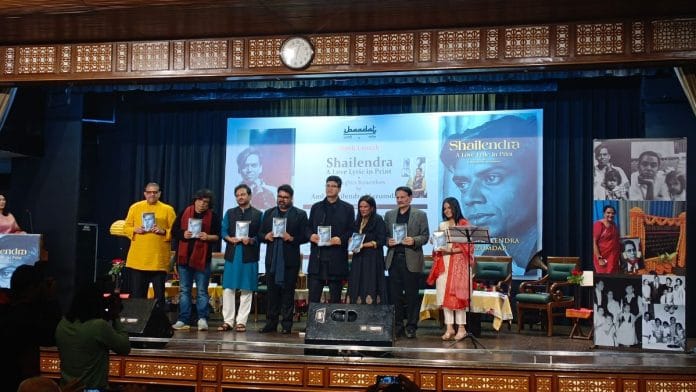New Delhi: Bhaiya Mere Rakhi Ke Bandhan Ko Nibhana. The Bollywood song that celebrates the bond between brothers and sisters, and one without which Rakshabandhan feels incomplete, has a tragic backstory. The song, from the 1959 movie Choti Behan, was written by lyricist Shailendra in memory of his two sisters who died in their childhood.
The younger sister Kamla’s death was especially traumatic for him; she held a special place in his heart. Later Shailendra met Hena Rani Dutt, the sister of his high school classmate, with whom he formed a lifelong sibling bond.
Similar tales from Shailendra’s life and the backstories of his iconic songs were revealed at the recent book launch-cum-musical event organised by Ibaadat Foundation at the India Islamic Cultural Centre, Shailendra: A Love Lyric in Print, a book by the lyricist’s daughter Amla Shailendra Mazumdar.
“We saw our life’s journey through Baba’s songs,” said Mazumdar.
Another famous Hindi film song that many Indians hum during pleasant weather or on road trips is “Suhana Safar Aur Ye Mausam Haseen, Humein Dar Hai Ke Na Hum Kho Na Jaye Kahin.” The song is from the 1958 rebirth-revenge drama Madhumati. Unlike other film noirs, which were mostly filmed indoors, Madhumati was shot at outdoor locations such as Ranikhet, Ghorakhal, Vaitarna Dam, Aarey Milk Colony, and various hill stations.
This track was inspired by a place in Pakistan. Shailendra spent his childhood playing in the snow-covered hills of Murree, now a popular destination for visitors in Pakistan. While Shailendra’s grandfather served in the army under British rule and ran the military canteen, Shailendra used to play in the snow and admire the beauty of the hills, which later inspired him to create this evergreen song.
Also read: Danish Husain’s Habibnama more than a tribute to Habib Tanvir. It resurrects his voice, truth
Playtime, kids and hunger for success
Who could have ever imagined that the beloved song Nanhe Munne Bachche Teri Mutthi Mein Kya Hai, which resonates with nearly every generation, came from the antics of Shailendra’s own children? This song was a memorable part of the 1954 film Boot Polish.
“One evening us kids and Mummy went to a tailor shop. Buntoo Bhaiya (Shailey Shailendra) stuffed his pockets with cloth scraps to make a ball with them. Later, when we returned home, Dina Aunty noticed Buntoo Bhaiya’s bulging pockets and teasingly asked, “Nanne Munne Bachhe, teri pocket mein kya hai?” With a smile, Buntoo Bhaiya pulled out the scraps, singing, “Pocket mein hai katran hamari,” Mazumdar said.
While Shailendra’s wife got annoyed looking at the mess created with cloth scraps, he was all smiles. “I’m certain he had some lines ready in his mind for another song,” recalled Mazumdar.
Another children’s favourite was Shailendra’s song “Chakke Mein Chakka, Chakke Pe Gaadi” from the 1968 film Brahmachari. It was inspired by all the moments Shailendra spent on the balcony of his home, watching his kids play on the ground. Shailendra sometimes played cricket with the boys. However, he mostly admired the children from afar as they played hockey, badminton, seven tiles, and sometimes ‘Langdi’.
“Our excitement knew no bounds when we discovered that ‘Lalli Tamata’ and ‘Gattu Gatheela’ (two comic characters from Brahmachari) were based on our group of friends,” added Mazumdar. The book also includes a section on Shailendra’s songs written for children.
It also highlights how Shailendra’s simple, everyday conversations found their way into Bollywood films. For instance, during a meeting with Raj Kapoor, Shailendra made a casual remark: “Hum Bhi Hai Tum Bhi Ho Aamne Samne.” These seemingly ordinary words later inspired a powerful verbal confrontation in the 1961 film Jis Desh Mein Ganga Behti Hai, where they were used in the iconic exchange between Kapoor’s character, Raju, and the dacoits.
Shailendra moved to Mumbai with his wife from Uttar Pradesh in 1947 shortly after getting married. Mazumdar shared how her mother reminisces about the early days when money was tight, and with just one potato in the house, they had to choose whether to eat it for lunch or save it for dinner. Later in his career, Shailendra wrote songs about hunger and the longing for good food.
Aalu tamatar ka saag, imli ki chutney bane, roti karari sike, ghee usme asli lage! The song Suraj Zara Aa Paas Aa was featured in the 1959 movie Ujala, features Shammi Kapoor.
(Edited by Ratan Priya)






